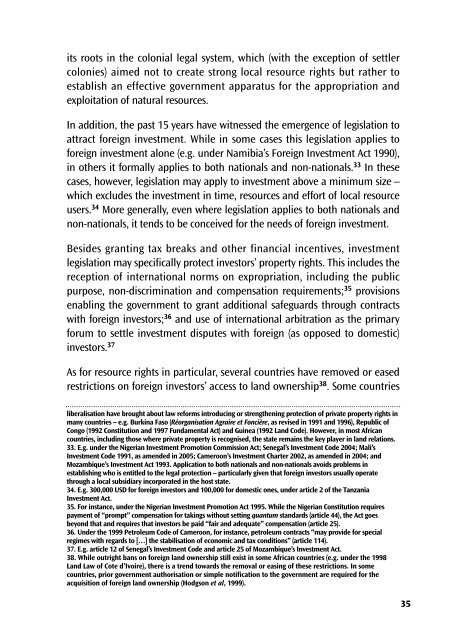Legal empowerment for local resource control
Legal empowerment for local resource control
Legal empowerment for local resource control
Create successful ePaper yourself
Turn your PDF publications into a flip-book with our unique Google optimized e-Paper software.
its roots in the colonial legal system, which (with the exception of settler<br />
colonies) aimed not to create strong <strong>local</strong> <strong>resource</strong> rights but rather to<br />
establish an effective government apparatus <strong>for</strong> the appropriation and<br />
exploitation of natural <strong>resource</strong>s.<br />
In addition, the past 15 years have witnessed the emergence of legislation to<br />
attract <strong>for</strong>eign investment. While in some cases this legislation applies to<br />
<strong>for</strong>eign investment alone (e.g. under Namibia’s Foreign Investment Act 1990),<br />
in others it <strong>for</strong>mally applies to both nationals and non-nationals. 33 In these<br />
cases, however, legislation may apply to investment above a minimum size –<br />
which excludes the investment in time, <strong>resource</strong>s and ef<strong>for</strong>t of <strong>local</strong> <strong>resource</strong><br />
users. 34 More generally, even where legislation applies to both nationals and<br />
non-nationals, it tends to be conceived <strong>for</strong> the needs of <strong>for</strong>eign investment.<br />
Besides granting tax breaks and other financial incentives, investment<br />
legislation may specifically protect investors’ property rights. This includes the<br />
reception of international norms on expropriation, including the public<br />
purpose, non-discrimination and compensation requirements; 35 provisions<br />
enabling the government to grant additional safeguards through contracts<br />
with <strong>for</strong>eign investors; 36 and use of international arbitration as the primary<br />
<strong>for</strong>um to settle investment disputes with <strong>for</strong>eign (as opposed to domestic)<br />
investors. 37<br />
As <strong>for</strong> <strong>resource</strong> rights in particular, several countries have removed or eased<br />
restrictions on <strong>for</strong>eign investors’ access to land ownership 38 . Some countries<br />
liberalisation have brought about law re<strong>for</strong>ms introducing or strengthening protection of private property rights in<br />
many countries – e.g. Burkina Faso (Réorganisation Agraire et Foncière, as revised in 1991 and 1996), Republic of<br />
Congo (1992 Constitution and 1997 Fundamental Act) and Guinea (1992 Land Code). However, in most African<br />
countries, including those where private property is recognised, the state remains the key player in land relations.<br />
33. E.g. under the Nigerian Investment Promotion Commission Act; Senegal’s Investment Code 2004; Mali’s<br />
Investment Code 1991, as amended in 2005; Cameroon’s Investment Charter 2002, as amended in 2004; and<br />
Mozambique’s Investment Act 1993. Application to both nationals and non-nationals avoids problems in<br />
establishing who is entitled to the legal protection – particularly given that <strong>for</strong>eign investors usually operate<br />
through a <strong>local</strong> subsidiary incorporated in the host state.<br />
34. E.g. 300,000 USD <strong>for</strong> <strong>for</strong>eign investors and 100,000 <strong>for</strong> domestic ones, under article 2 of the Tanzania<br />
Investment Act.<br />
35. For instance, under the Nigerian Investment Promotion Act 1995. While the Nigerian Constitution requires<br />
payment of “prompt” compensation <strong>for</strong> takings without setting quantum standards (article 44), the Act goes<br />
beyond that and requires that investors be paid “fair and adequate” compensation (article 25).<br />
36. Under the 1999 Petroleum Code of Cameroon, <strong>for</strong> instance, petroleum contracts “may provide <strong>for</strong> special<br />
regimes with regards to […] the stabilisation of economic and tax conditions” (article 114).<br />
37. E.g. article 12 of Senegal’s Investment Code and article 25 of Mozambique’s Investment Act.<br />
38. While outright bans on <strong>for</strong>eign land ownership still exist in some African countries (e.g. under the 1998<br />
Land Law of Cote d’Ivoire), there is a trend towards the removal or easing of these restrictions. In some<br />
countries, prior government authorisation or simple notification to the government are required <strong>for</strong> the<br />
acquisition of <strong>for</strong>eign land ownership (Hodgson et al, 1999).<br />
35

















